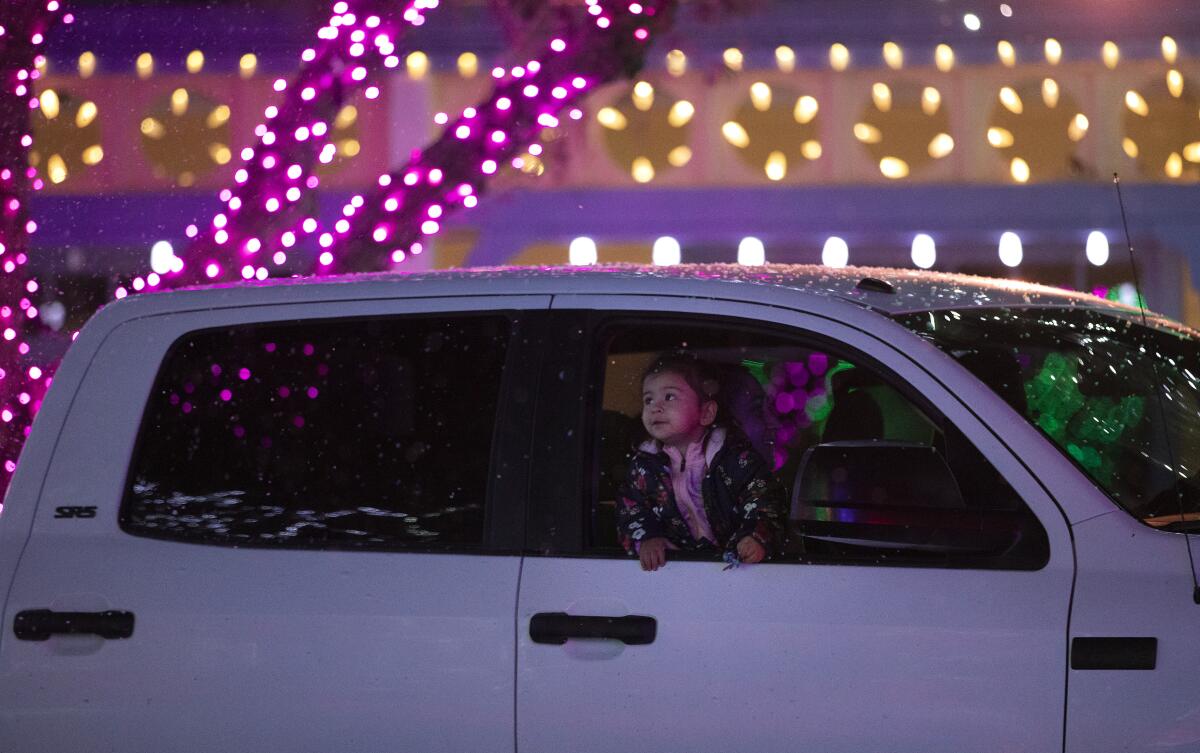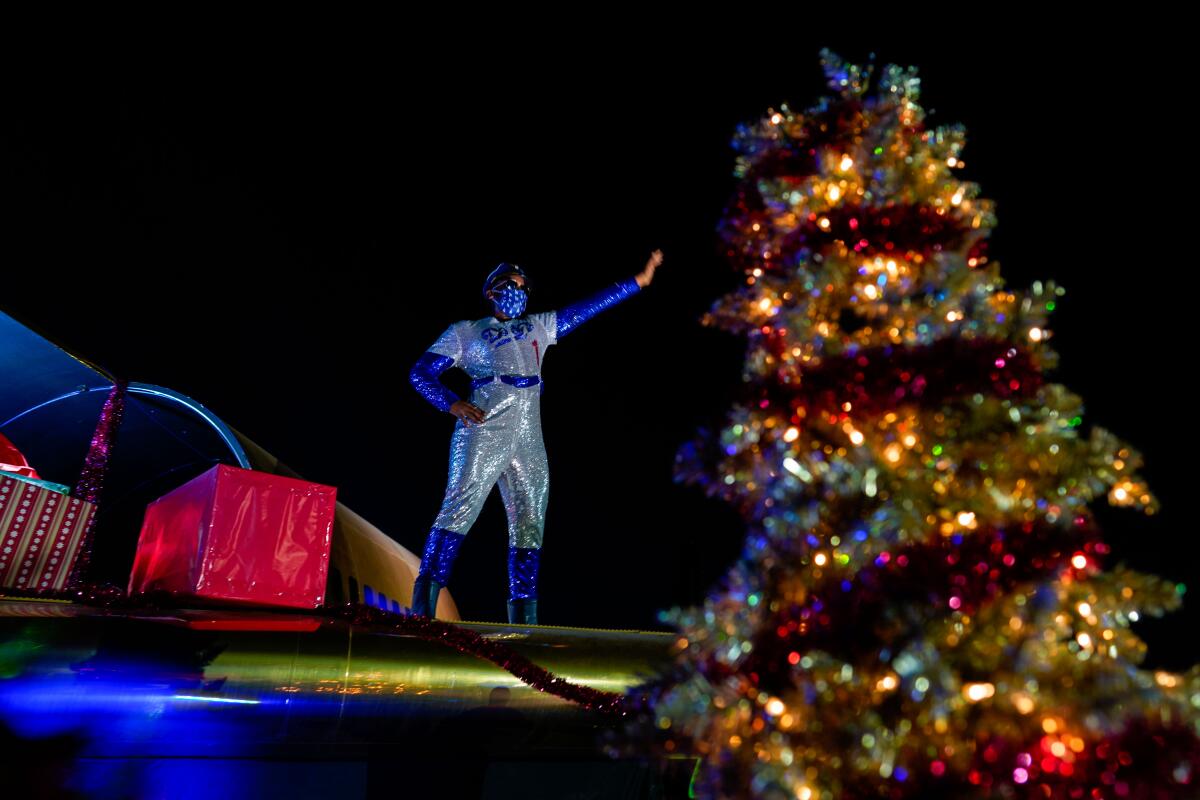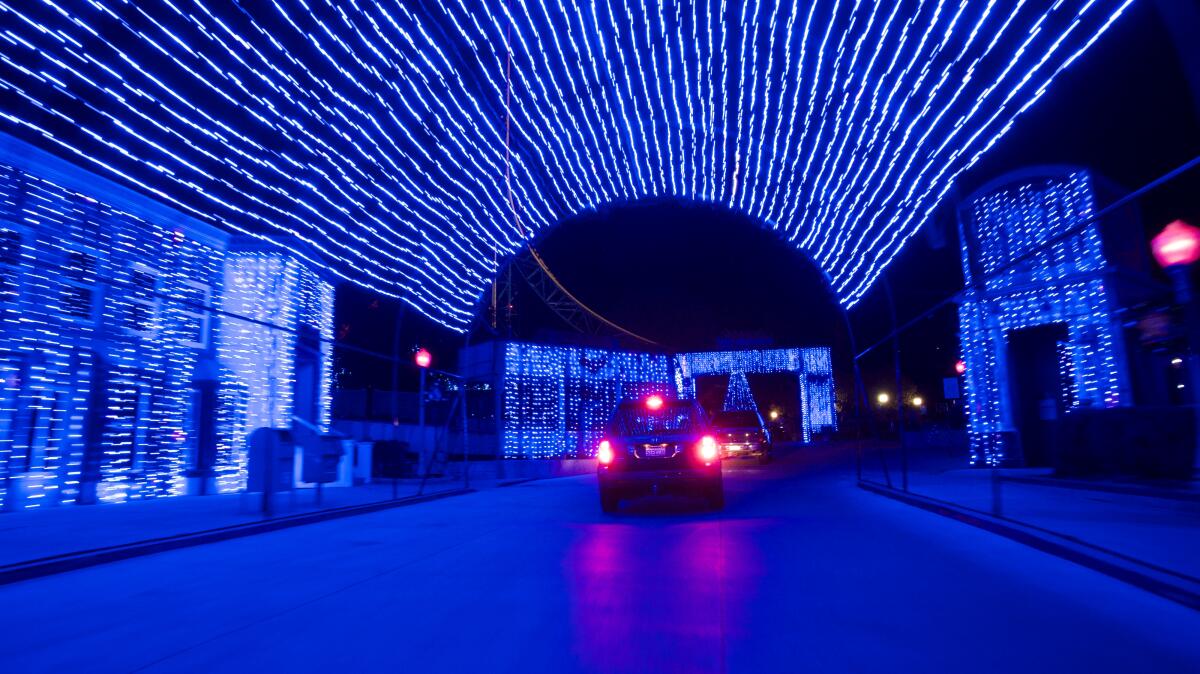Fairgrounds, theme parks open drive-through holiday shows to offset lost revenue

- Share via
Roller coaster enthusiast Gregg Condon hasn’t been able to jump on his favorite thrill rides since the pandemic forced nearly all of California’s theme parks to close nine months ago.
But he recently returned to Six Flags Magic Mountain in Valencia with his family for a more sedate experience: a drive through the amusement park to admire trees, buildings and oversized decorations adorned with thousands of multicolored twinkling lights, accompanied by blaring holiday music.
“There are certain things that can’t be done in 2020, but I think Magic Mountain did a fantastic job of adapting to a very tough situation,” the Oxnard resident said.
With the pandemic putting an end to large public gatherings, theme parks, fairgrounds, racetracks and other venues that host huge crowds are adapting by launching holiday drive-through events in hopes of recovering some of the revenue they’ve lost in the ongoing health crisis.
Drive-through light shows are now operating at Irwindale Speedway, Dodger Stadium, a water park in San Dimas and the Los Angeles, Orange County, Ventura and San Diego county fairgrounds, among other locations.
The events have health officials’ blessing because guests don’t mingle: They never even get out of their cars.
Holiday revelers, desperate for family activities, have been inundating such events. Still, the revenue from the light shows is expected to make up only a fraction of the lost income.
The Orange County Fair & Event Center — home to the Orange County Fair, Costa Mesa Speedway and Pacific Amphitheatre — is expected to lose about $46.8 million in revenue this year because of the cancellation of the fair, car and motorcycle races and concerts, fair officials said.
The event center is hosting a holiday Night of Lights drive-through nightly until Jan. 10, expecting about 1,500 cars per night. But that’ll bring in only about $150,000 for the venue, fair officials say. The rest of the revenue goes to the event promoter.
“It’s helping, but it obviously doesn’t replace the lost revenue,” said Miguel Santana, chief executive and president of the Fairplex in Pomona, which is expected to lose about $45 million in revenue this year from the cancellation of the Los Angeles County Fair, car shows, concerts and other events.
The Fairplex is hosting a drive-through light show based on the “Elf on the Shelf” picture book. Santana declined to say how much money the event is expected to draw but said it will “generate minimal revenue in relation to the revenue lost.”

Six Flags Magic Mountain also declined to disclose how much revenue its Holiday in the Park drive-through event is expected to draw, but representatives said attendance will remain below half of the park’s outdoor capacity.
The park’s parent company, Six Flags Entertainment Corp., reported in October a revenue decline of $979 million in the first nine months this year compared with the same period last year.
Throughout the pandemic, businesses have been scrambling to devise ways to stay alive until conditions return to normal.
Card rooms have added outdoor gambling tables in their parking lots, distilleries are producing hand sanitizer, and sports leagues are playing matches in arenas and stadiums devoid of fans.
Drive-through light shows are the most prominent money-making efforts at large venues, but fairgrounds and stadiums have also launched other revenue boosters such as drive-in movie showings. The Rose Bowl in Pasadena is hosting a drive-through event featuring animatronic dinosaurs. The Fairplex in Pomona is generating some revenue by storing cars for auto rental companies whose business has dramatically declined.
Businesses “are trying to generate revenue to increase their chances of survival until they come out on the other side,” said Greg Brown, a finance professor and executive director of the Kenan Institute of Private Enterprise at the University of North Carolina.
He predicted that such efforts as the holiday light shows could live on as ways to make extra money after the pandemic ends.
“I think people will come up with all kinds of revenue streams that they didn’t think of before,” Brown said.

The drive-through light shows direct drivers along paved paths bordered by brightly lit trees, buildings and other attractions, along with oversized holiday decorations and costumed performers.
At the Elf on the Shelf event in Pomona, performers in red elf costumes juggle, dance and balance on a tightrope on the side of the path. A smartphone app that visitors are encouraged to download plays music and a story narration, in sync with the sights along the drive.
At Six Flags Magic Mountain music blares from outdoor speakers and, in addition to lights adorning the buildings and trees, colored images of snowflakes are projected on walls. A giant pendulum attraction called CraZanity is also bedecked in lights. In a few spots, fake snow drifts from the trees.
But the price of such entertainment can be steep.
For the Elf on the Shelf drive-through, tickets range from $25 to $35 for children and $30 to $40 for adults, depending on the day of the week. The prices go up for package deals that include holiday merchandise or a “socially distanced photo opportunity with Santa.”
Other light shows, charge by the carload, such as the one at Irwindale Speedway ($59).
Are they fun? Reactions have varied. One of the Yelp reviewers who gave five stars to the Elf on the Shelf event wrote: “I would definitely recommend this to anyone who has younger children or if you are just a kid at heart.” But others called it dull and uninspiring. “The entire event was a forced marketing to bring Christmas cheer,” one wrote.
Irwindale Speedway closed in early March because of the pandemic, resulting in what is expected to be a $6.5-million drop in revenue compared with last year, according to Tim Huddleston, president of the speedway.
In recent months, Huddleston said he considered opening a temporary drive-in movie theater to show holiday films as a way to keep revenue flowing. But he soon discovered that the number of cars he could fit into the facility to see a movie wasn’t enough to turn a profit.
Huddleston said he got the idea for a drive-through light show after meeting Jason Zdenek, president of Mobile Illumination, the company behind light displays at malls, theme parks and movie studios including Universal Studios Hollywood and the Americana at Brand in Glendale.
“A cartoon light bulb went off over my head,” Huddleston said. “I have a lot of time, a lot of space and a lot of electricity.”
The result was a 2.5-mile drive-through that starts on the drag strip and continues throughout the track, into the pit area and under the bleachers, featuring 20-foot illuminated lollipops and a 100-foot Christmas bow. It also features a 110-foot-tall light tree that shines with more than 100,000 LED bulbs.
Huddleston couldn’t predict how much revenue the event would bring, but he said he was optimistic because the crowds were huge the first few nights.
“We have our fingers crossed and are hoping for the best,” he said. “Failure is not an option. We have to make it work.”
More to Read
Inside the business of entertainment
The Wide Shot brings you news, analysis and insights on everything from streaming wars to production — and what it all means for the future.
You may occasionally receive promotional content from the Los Angeles Times.











